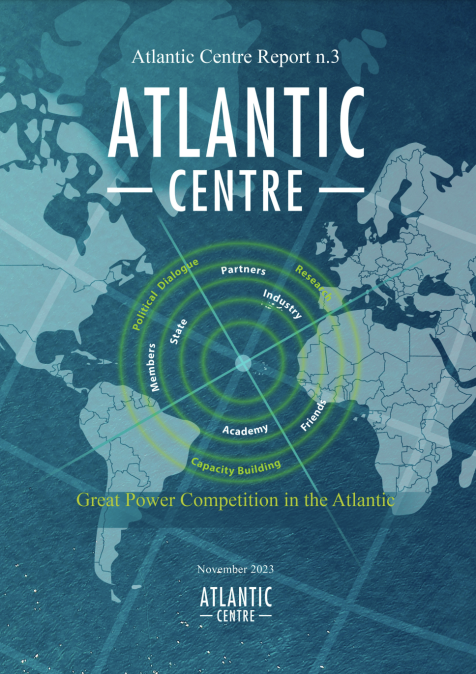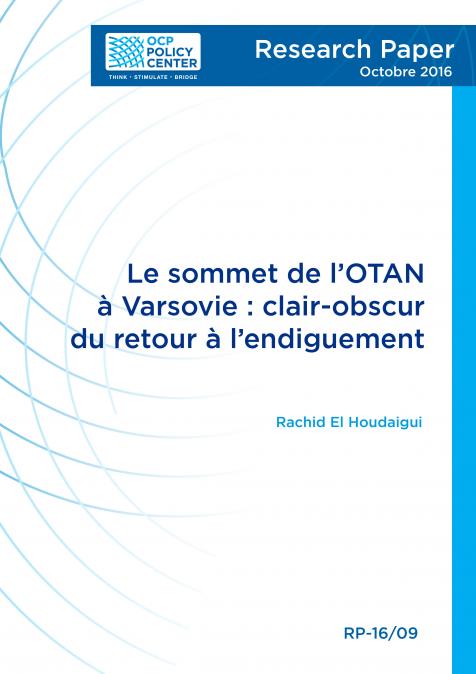Publications /
Opinion
In the delightful garden restaurant of the Marrakech hotel Mamounia, the tables had been set for hundreds of guests, 16 seated at each. Flowers had been arranged and there were crystal wine glasses. Yet, on this Wednesday, December 14 , at 7 p.m., only one table was occupied. Among the guests around it were a Turkish NATO-assigned general, Aydin Killiç, camouflaged in a dark tailored suit; a former Italian ambassador, Alessandro Minuto-Rizzo, President of the NATO Defense College Foundation; Roy Scheibenpflug, a German Lieutenant Commander and one of the general’s staffers assigned to the NATO Joint Force Command near Naples, Italy; and Amit Jain, Director of the Centre for African Studies at the Nanyang Business School in Singapore.
By 8 p.m. they were the only diners. Their friends and colleagues, more than 200 ambassadors, former presidents from Ecuador and Bolivia, the Portuguese defense minister, André Azoulay, Senior Advisor to His Majesty King Mohammed VI, UN-assigned Senegalese General Birame Diop, former ministers including Elizabeth Guigou (France) and her Spanish colleague Ana Palacio ... All were participants in the Atlantic Dialogues conference, invited by the Executive Director of the Policy Center for the New South, Karim El Aynaoui, to debate ‘Cooperation in a Mutating World: Opportunities for the Wider Atlantic’. But the urgent subject was put on hold. New ideas had to wait as the cooks and waiters at the Mamounia garden restaurant took a break that paralyzed the Kingdom at least for two hours.
A day or two prior the conference, the organizers had decided to cancel the so-called ‘night owls’ sessions, scheduled from 10 p.m. to 11.30 p.m., because some participants, particularly those from Morocco and France, would be unable to concentrate on fundamental subjects such as ‘Atlantic Multilateralism and Prospects for an Atlantic Community’, while history was being written, or rather kicked, elsewhere. France, the football world champions, the colonial power of yesteryear, would be challenged by Morocco, whose team, known as the Atlas Lions, was causing shock and wonder not only in Qatar, which was hosting the football World Cup, but around the world.
For years, Moroccan football fans, who dreamed of fluid football, techniques they practiced themselves on unpaved streets or the beaches of Essaouira or Casablanca, followed the stars of Barcelona and Real Madrid, buying shirts that carried names such as Zidane, Ramos, Piquet, Iniesta, Xavi, and Messi. Yet on December 6, the Atlas Lions, clad in green and red, confronted Spain, one of the World Cup favorites, in the Education City Stadium in Qatar. It was widely expected to be the end of Morocco’s dream. But no: Morocco won 3:0 on penalties. The giant-killers also eliminated Belgium, another contender for the title, and sent the Portuguese packing, and the world star Ronaldo perhaps into international retirement. Confidence captured the national team. Any inferiority complex, if there was one, disappeared with each triumph. Gone was Neymar and his Brazil, who behaved like world champions prior to their first game, arrogant, too relaxed, concentrating on dance rhythms after scoring before they could score. Gone were the Netherlands, England, Germany, giants of football. Morocco reached the semifinal! No other Arab team has ever triumphed like the Atlas Lions. No African team could boast such success. History has been written in Qatar, and unusually, the Arab world united in its support for the Atlas Lions.
The Moroccan team demonstrated that team spirit, discipline, and self-confidence, channeled by an able coach who understands psychology and culture of the nation and his players, can achieve the almost impossible. The world of football, and even those who prefer playing golf or riding, were enchanted, applauding the “resilience and unbelievable endurance of Morocco’s team”, as General Kiliç, who played as a youngster but hardly follows games, said. The enthusiasm of the North African nation touched the Italian member of parliament and member of the Foreign Affairs Committee, Vincenzo Amendola, who is married to a Moroccan woman: “It is identical to the Italian excitement, the joy, the limitless trust that they could become world champions”.
The global media discovered not only the African miracle on the football pitch, but the land itself, its people, deserts, beaches, mountains, along with its wine industry, solar panels, donkeys, universities like Mohammed VI, soon turning into a beacon of Africa, a nation ready to face challenges as their team has dared. When Dominique Strauss-Kahn, speaker at the Plenary Session III, ‘Consequences of Inflation in the Wider Atlantic’, was asked by the German moderator Ali Aslan how he would deal with loyalties towards both teams, since he was French while partly living in Morocco and his wife is a Moroccan citizen, the former Managing Director of the International Monetary Fund and French Minister of Economy and Finance (1997- 1999) wiggled his way out by answering that for him it “was like deciding between father and mother”. But yes, he would support Morocco. The applause possibly suffocated a late correction: Strauss Kahn added a French victory would make him happy as well.
The cooks and waiters were convinced some of the TV followers would storm the dining room after Theo Hernandez scored the first goal for France after five minutes of play. But while the game was still underway, neither food nor the thought formulated in the conference agenda, that “in this mutating world, pressures on States’ stability have increased with war, pandemics, and natural disasters shaking their international system to the core”, could overshadow the fascination with a match that will enter Moroccan history books. When dessert was served, the diners hurried to the conference hall to experience the last minutes of drama, witnessing in the 79th minute the decisive goal by France’s Muani. Disappointment did not trigger a backlash—the kingdom won, one way or another. Jorge Castaneda, Professor of Political Science and Latin American Studies at New York University and a participant in the Atlantic Dialogues, was disappointed about his own team, Mexico, but was full of praise for “how the Moroccan players dealt with the pressure and expectations of their people and a whole continent”.
The intellectual ceasefire at the conference was extended long enough for me to be informed by some French fans that a number of Moroccan stars were born in Spain (Ashraf Hakimi), goalkeeper Yassine Bounou was born in Montreal, Chelsea professional Hakim Ziyech and others in Holland (Ziyech even played for the Dutch national under 20 and under 21 teams, and was signed by Ajax Amsterdam). The impressive Moroccan coach, Walid Regragui, insisted a French political science professor at the conference, was born in Corbeil-Essonnes, played professional football not only in Morocco, but in Toulouse, Grenoble and Paris.
His Majesty, King Mohammed VI apparently called Regragui after the defeat to France and congratulated him for the great performance of his team. Just three months after he became coach he had achieved a miracle, yet in the hour of triumph, Regragui remained modest: “We allowed children to dream,” he said. Among them were some adults at the Atlantic Dialogues.





